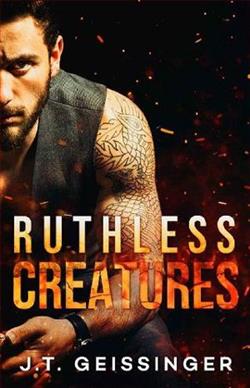Page 1 of Midnight Valentine
1
“Do you believe in reincarnation?”
“Megan. We’ve been over this before.”
“And you’ve never given me a straight answer. It wouldn’t kill you to come right out and say one way or another.”
“What’s important is what you believe, and why.”
I sit up from the uncomfortable leather sofa I’ve been lying on every Thursday for fifty minutes for the past two years and look at Dr. Singer. He’s handsome in a 1950s-engineer way, crew-cut silver hair and a pair of horn-rimmed glasses, a classic white button-down shirt. I knew within ten minutes of our first visit that I could trust him, knew also that I’d lie to him like I’d lied to every other therapist I’d visited before.
There are truths too painful to be spoken aloud. Some demons should be left to rot in the dark forever.
“It’s our last session, Dr. Singer. Which means it’s your last chance to help me.”
Though he’s trained to keep a neutral expression, he visibly winces. “Do you feel I haven’t helped you, Megan?”
Of course you haven’t. But it’s not his fault all my shattered pieces can’t be glued back together, so I smile and say something nice. “You’re the best therapist I’ve ever had.”
He studies me. Behind the horn-rimmed glasses, his eyes are the color of old denim, faded from the acid wash of too many sad stories. Too many poisonous secrets have bleached them bone pale.
“Will you call Dr. Anders when you arrive in Oregon?”
“Yes,” I lie. “As soon as I’m settled.”
“I hope you do. He’s a good man. Highly qualified.”
“You’re highly qualified too. Look where that got us.”
We gaze at each other while the clock ticks quietly on the wall. Somewhere outside, a dog howls. The sound is unbearably lonely.
“You’re an intelligent woman, Megan. You know therapy will never work if you don’t commit to it.”
“I’ve been here without fail every week for two years. That’s commitment.”
“Your body’s been here, but your mind has always been somewhere else. You’ve never been completely open and truthful. Tell me I’m wrong.”
I pick up my handbag from the floor, sling it over my shoulder, and stand, ready to be done with all this. I’ve got a moving van waiting, a new life to start, a thousand dreams to bury in the desert sand.
“I’ll make you a deal. Tell me if you believe in reincarnation, and I’ll tell you something true. Anything you want to know, I’ll answer honestly.”
Dr. Singer stands, unfolding all those gangly limbs of his, and comes out from behind his desk. He stops in front of me and props his hands on his hips. “All right. I suppose better late than never.” He’s thoughtful for a moment, then says, “No, I don’t believe in reincarnation. Or an afterlife, to be perfectly frank. I think this is as good as it gets, which is why it’s so important to make the best of this life. To confront our problems, to work through them, so ultimately we can be free of them and enjoy the time we have.”
Unsurprised by this answer, I nod. “Okay. Thanks.”
In an unusual show of affection, he rests his hands on my shoulders and gazes down into my face. He says softly, “Now here’s my question: why haven’t you let me help you?”
He looks so earnest. I’m moved by his obvious sincerity, by how much he wishes he could help me, by the goodness of this person who thinks all life’s problems can be solved by talking about them.
“Because no matter how much you might want to, Dr. Singer, you can’t help someone who’s already dead.”
I pat his hand, sorry for that look of dismay I’ve caused, then turn and walk out the door.
* * *
It’s a twenty-two-hour drive from Phoenix to Seaside if you go straight through, but I stop overnight in a town with one traffic light, rent a room in a cheap motel, and lie atop the bedcovers, fully dressed, staring at the ceiling until it gets light. Then I drink three cups of terrible coffee in the small diner attached to the motel and get back on the road.
The I-5 through California is one long, boring stretch of highway, crowded with eighteen-wheelers. I listen to a blues station as the urban sprawl gives way to fields of almond trees and cow pastures. The rolling hills of the central valleys are dotted with the rangy silhouettes of oak trees, and the long grasses are burned brown from the summer sun. I take a left turn at Portland, then it’s another hour and a half to my final destination. By the time I pull into Seaside, I’m exhausted and starving, but strangely relieved.
One more day in Phoenix might have put me over this edge I’ve been living on so long.
The real estate agent has already sent me the key to the house, but I decide to stop and get something to eat before going over. I pull into another diner, this one full of gray-haired old couples and one man sitting alone in a booth near the back, staring out the window into the gently falling evening rain.
Even sitting down, his size is obvious. His broad shoulders strain the seams of his black raincoat. His hands dwarf the ceramic mug they’re wrapped around. He looks like he had to wedge himself between the booth and the table to sit down.
It isn’t his size that really stands out, however. It’s the menacing air of stay away that emanates from him, the way he hunches over, the way the hood of his raincoat casts dark shadows over his face. As if he doesn’t want anyone to look at him.
As if he’s hiding.
“What can I get you, honey?”
The waitress standing behind the counter holds a carafe of coffee. She’s somewhere north of sixty, plump and red-cheeked, smiling like we’re old friends. I sit on one of the stools and plop my handbag on the counter. “I’ll have some of that coffee, please. And a Denver omelet with extra bacon on the side.”
If she thinks it odd that I want an omelet for dinner, she doesn’t mention it. She just nods and pours me a mug of coffee, then says she’ll be right back.
When she heads into the kitchen, I look around, sipping my coffee. It was too dark as I drove in to get a good view of the town, but I’ve studied the details long enough to have them memorized.
Seaside, Oregon is a small resort city with a beach known for its surf breaks, and a 1920s promenade with an arcade and an old-fashioned carousel. The population is a hair over six thousand, a far cry from the one and a half million who crowd Phoenix. The air is different here too, fresh and bracing, filled with the scent of salt and pine instead of smog and stone baked by the unrelenting desert sun.
I hope everything will be different here. I hope I can leave all my nightmares behind.
Preoccupied with thoughts of all the work that needs to be done to the house, I drink my coffee and eavesdrop on conversations, trying not to wonder what Cass would have to say about this place. How he’d be bouncing off his stool with excitement.
It’s several minutes before I realize I’m uncomfortable.
Surprised by the intensity of the feeling, I glance around. None of the patrons are looking my way. The music is cheerful, the interior of the diner is clean and bright, and everything appears normal. Boring, even.
Then why is the skin on the back of my neck crawling?
I glance over my shoulder and discover the reason. The guy in the raincoat is looking at me. No, not looking—glaring. Conspicuously hostile, he stares at me with total revulsion, as if I’ve deeply offended him in some way.
Cold, hard, and utterly black, his eyes are like obsidian.
I raise my brows and stare back at him, because I don’t have time for assholes with attitude problems.
“Here you go, honey.” The nice waitress deposits a plate in front of me. It’s overflowing with an omelet that could feed a family of four, topped by a messy pile of hash browns.
“Wow. That’s a lot of food.”
She laughs, her stomach jiggling. “I should’ve warned you about the portion sizes. Cal—that’s my husband—is the cook, and he likes folks to leave feeling like they got a lot for their money.”
“Tell Cal you can raise the price of this omelet by ten dollars, and I’d still feel like I got a lot for my money.” I poke at the huge, fluffy mound with my fork. “How many eggs are even in this thing?”
She chuckles. “Who knows. I gave up trying to get him to follow recipes years ago. I hope you like it, honey.”
“I’m sure I will, thanks.”















